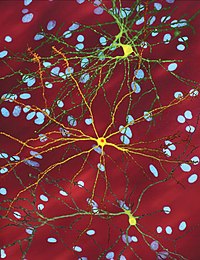
Photo from wikipedia
Huntington's disease (HD) is characterized by preferential loss of the medium spiny neurons in the striatum. Using CRISPR/Cas9 and somatic nuclear transfer technology, we established a knockin (KI) pig model… Click to show full abstract
Huntington's disease (HD) is characterized by preferential loss of the medium spiny neurons in the striatum. Using CRISPR/Cas9 and somatic nuclear transfer technology, we established a knockin (KI) pig model of HD that endogenously expresses full-length mutant huntingtin (HTT). By breeding this HD pig model, we have successfully obtained F1 and F2 generation KI pigs. Characterization of founder and F1 KI pigs shows consistent movement, behavioral abnormalities, and early death, which are germline transmittable. More importantly, brains of HD KI pig display striking and selective degeneration of striatal medium spiny neurons. Thus, using a large animal model of HD, we demonstrate for the first time that overt and selective neurodegeneration seen in HD patients can be recapitulated by endogenously expressed mutant proteins in large mammals, a finding that also underscores the importance of using large mammals to investigate the pathogenesis of neurodegenerative diseases and their therapeutics.
Journal Title: Cell
Year Published: 2018
Link to full text (if available)
Share on Social Media: Sign Up to like & get
recommendations!